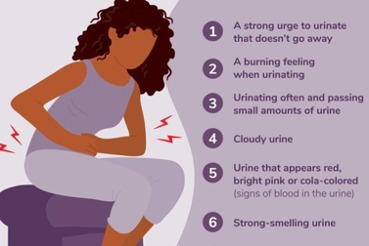By Asenath Were
When the topic of Urinary Tract Infections (UTIs) comes up, many people immediately associate them with dirty toilets or urinals. However, during an in depth conversation with Ms Christine Wako, a clinical officer at Uganda Christian University’s (UCU) Allan Galpin Health Centre, I discovered that UTIs are not actually contracted from dirty toilets. Are you as surprised as I was? Well, let me share with you the things you need to know about this disease.
Understanding urinary tract infections (UTIs)
Urinary Tract Infections (UTIs) occur in any part of the urinary system, which comprises the kidneys, ureters, bladder, and urethra. Ms Wako explains that the urinary system is divided into two parts: the upper, which includes the kidneys and ureters, and the lower, consisting of the bladder and urethra.
“Urine is primarily produced by the kidneys and travels through the ureters to the bladder, where it is stored before being expelled from the body via the urethra,” she explains.
Symptoms of UTIs
According to Wako, UTIs present in various ways, including frequent urination with little volume coming out, urgency to urinate, blood in urine, and in men, the presence of pus in urine.
“We take it seriously when men present with infections because, unlike women, their urinary structure makes them less prone to infections. When a man finally shows symptoms, the condition is often critical,” she explains.
Causes of UTIs
Contrary to popular belief, UTIs are not caused by dirty toilets but by poor personal hygiene.
“We fail to clean ourselves properly after using the toilet or shaving adequately,” she notes. This creates an environment for Escherichia coli (E. coli), a bacteria found in the digestive tract and excreted in feces, to thrive.
Improper wiping may leave faeces near the anus, which can move up to the urethra, leading to infection. Additionally, poor water intake contributes by concentrating urine in the bladder, which attracts bacteria due to its odour.
Holding urine for long periods is another risk factor. “Many people avoid using public toilets, opting to hold urine until they reach their rooms. However, this poses a greater risk of infection than using the toilet,” Ms Wako warns.
Another overlooked cause is sexual intercourse. She emphasises that inadequate hygiene by sexual partners can lead to bacterial transfer, increasing the risk of UTIs.
Treatment and Prevention
Ms Wako advises anyone experiencing symptoms to seek medical attention for suitable antibiotic treatment. She also recommends drinking plenty of water and consuming yoghurt, which contains Lactobacillus bacteria.
“This bacteria naturally resides in the gut, urinary tract, and female reproductive system without causing harm.Thus taking yoghurt will restore a healthy balance of yeast and bacteria in the reproductive system and normalise its Ph,” she explains.
To prevent UTIs, she urges proper personal hygiene. “Always wipe from front to back after using the toilet and ensure thorough shaving to prevent bacteria from clinging to pubic hair.”
She also advises drinking at least one litre of water daily to flush out bacteria, avoiding prolonged urine retention, and maintaining hygiene, especially for those who are sexually active.
Student’s experience
A second-year journalism student, who requested anonymity, shared her experience with UTIs in high school, which made her more cautious about hygiene.
“I wasn’t sure what was wrong, but I felt a frequent urge to urinate, experienced a burning sensation, and had itching,” she recounts.
She says the school nurse advised her to dry her underwear in the sun after washing and avoid sharing personal hygiene items such as buckets.
“They warned me that sharing my bucket could spread the infection to others since I used it to wash my underwear,” she says.
Determined to prevent others from suffering the same problem, she ensured toilets were clean after use and openly discussed her condition with some of her friends and the school nurse, leading to increased awareness and improved toilet hygiene at school.
She encourages students not to shy away from seeking medical help. “UTIs can affect anyone. Prioritise hygiene, dry your underwear properly, and use panty liners to detect unusual discharges early,” she advises.
“The moment you detect any symptom, go to the clinic because the earlier you get treated the better,” she highlighted.
The student’s experience further highlights the need for awareness and early treatment to avoid complications. By adopting good hygiene practices, individuals can effectively prevent and manage UTIs, ensuring better urinary health.


